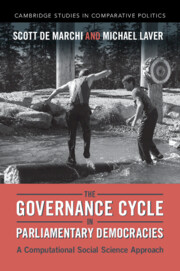
- Cited by 2
-
Cited byCrossref Citations
This Book has been cited by the following publications. This list is generated based on data provided by Crossref.
BÄCK, HANNA BERGMAN, MATTHEW E. and MÜLLER, WOLFGANG C. 2023. Coalition bargaining time and governments’ policy‐making productivity. European Journal of Political Research,
Müller, Wolfgang C. Bäck, Hanna and Hellström, Johan 2024. Coalition dynamics: advances in the study of the coalition life cycle. West European Politics, Vol. 47, Issue. 1, p. 1.
- Publisher:
- Cambridge University Press
- Online publication date:
- February 2023
- Print publication year:
- 2023
- Online ISBN:
- 9781009315449




